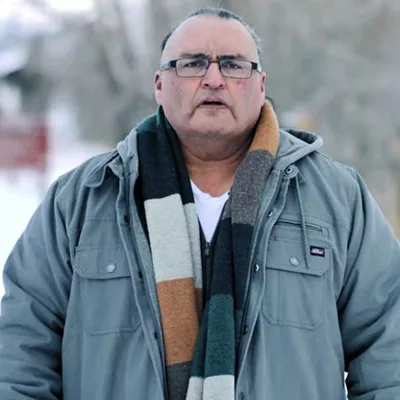Thomas' show, World Harmony: Can It Happen? has aired on Access Tucson twice monthly since April 2005. The program is dedicated to creating more peace and human harmony in the world. Prior to World Harmony, Thomas hosted The American Spirit, which ran for several years. Spirit focused on "what was right with this country and the people in it."
Thomas, a former New Yorker who attended the services of Pastor Norman Vincent Peale, the author of The Power of Positive Thinking, says he has been into positive thinking for much of his life. With a background in hospital human resources administration, Thomas has studied Peale's works, along with those of The Hour of Power's Robert Schuller. "I like to read positive books and watch positive tapes," he says.
The emphasis on the positive runs in the background of Thomas' show. But there is also a strong accent on creating peace.
"I've learned to appreciate life, my life and other people's lives," says Thomas. "I am so upset by unnecessary deaths due to wars--the problems for which don't have to be resolved in a war and killing. ... I'm not proud of some of the things we are doing. Our top leaders seem to think it's OK to have torture. That's not the American way I grew up with. ... In my mind, I ask: Why can't nations learn how to solve problems without killing each other?
"The show is not the key; the shows are vehicles, no matter what the (topic) is. It has to do more with my belief that God creates us, loves us, wants us to love each other, and not kill or torture each other."
To generate topics and guests for his show, Thomas "tries to keep abreast of local and world events. I involve myself in activities and meet people."
When Thomas was director of Tucson Open University, he met Mike Brewer, outpost leader and chaplain of Point Man Ministries International, a ministry run by veterans that provides counseling, literature and seminars for veterans. Brewer taught a program on anger management about three years ago.
Brewer, a retired Marine who served in Vietnam, will be the guest along with his wife, Lydia, on the Friday, Aug. 25 free taping of World Harmony: Can It Happen? The show takes place from 6 to 7 p.m. Arrive by 5:45 p.m. to guarantee seating. Access Tucson (Studio A) is located at 124 E. Broadway Blvd. The topic of discussion will be "Wives: The Original Peacemakers and Peacekeepers." Rebroadcasts of the show will run from noon to 1 p.m., Saturday, Sept. 2 and 9. Visit accesstucson.org for more information.
The Brewers have been married for 24 years and met well after Mike's tour in Vietnam. But they didn't realize Mike had post-traumatic stress disorder until many years into their relationship.
"Physicians didn't have an entry for post-traumatic stress disorder in their (diagnostic code manual) until about 20 years ago," says Lydia. While there are programs to help veterans with this disorder, Lydia says there is nothing for the wives. "When you are the wife of a combat veteran, there really is no one you can talk to about this."
To meet the need of veteran wives whose husbands have post-traumatic stress disorder, an online support group was started in 2002. The group's Web site is groups.msn.com/LivingwithPTSDVietnamWives. It is also open to wives and significant others of Afghanistan and Iraq veterans. Lydia says there are more than 500 members, with many from Southern Arizona.
She believes wives of combat veterans are peacekeepers and says the men in the best psychological shape are the ones whose wives have stuck by them. "There are a lot of women who when we were first married, we were stay-at-home moms. We had a family to hold together. We stayed with (our husbands)." And that meant living in the face of a disorder whose sufferers have nightmares, flashbacks, depression, hopelessness and a loss of interest in activities.
"No one is there to help the women to deal with their secondary stress. (They have to learn) what to watch for, what to do and how to handle it. ... The big thing we figured out over the last few years is you have to have a life outside your relationship. Don't cut the tie to the outside world. Learn stress-reduction techniques. Learn yoga ... You need to take care of yourself."
Lydia is active in the online support group and is one of its four managers. Her latest entry (as of press time) asks what the alternative is for women and men who are married to combat vets. Should they cut their losses and run? As a peacekeeper, Lydia says no, and writes the following:
"Having post-traumatic stress disorder doesn't mean you are a bad person. Studies show that it is actually the best and the brightest who are most deeply affected by the trauma of war. ... As long as we have war, we will have people troubled by memories of war. Who deserves a happy and successful life more than those who put their lives on the line to protect our country? Women have always been the peacemakers who bridge that place between our combat veterans and the rest of society."







